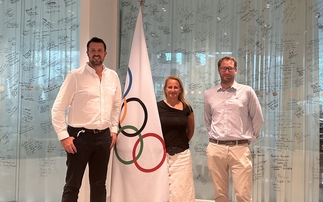
The Chancery Lane Project is building a library of free-to-use contractual clauses that companies can integrate into their every day operations to meet net zero goals
Want to find out more about how contract law and litigation can help drive forward the net zero transition? We're hosting two separate sessions on these vital topics at this week's Net Zero Festival. You can sign up for a free pass now.
Contract law may not get the same headline-grabbing attention as blockbuster climate litigation cases brought against feet-dragging governments or polluting oil and gas companies, but it could prove just as crucial to tackling the climate crisis. Because if you change the precedent clauses that form the building blocks of contracts, you can change the way the world works.
That is the view of Ben Metz, executive director of The Chancery Lane Project (TCLP), a not-for-profit organisation that has built a library of free-to-use contractual clauses that companies, regulators, and lawyers can use to translate headline climate and net zero targets into everyday business operations.
In an interview with BusinessGreen last month, Metz outlined how the opportunities to drive positive change through legal contracts are epic in their scale and scope. "Contracts govern pretty much all human interaction on the planet," he says. "They allow you to take a recommendation or ambition - for instance net zero as defined by the Oxford Principles - and code it into law into a way that is legally enforceable."
When writing contracts, lawyers tend to use what is known as a 'standard form contract' as a skeleton, then parse legal 'precedent banks' to find the more specific clauses that will customise the agreement, Metz explains. "So, if you can change the nature of the standard form contract, or change the precedent clause that has been dropped into the contract, you can change the world," he says.
TCLP is hoping to do just that. It has created trove of "climate-aligned clauses" that can be incorporated into law firm precedents and commercial agreements so as to drive real-world action towards net zero goals. The non-profit is targeting a range of stakeholders to increase awareness and uptake of these clauses across the legal sector, from the regulators that issue standard-form contracts and the knowledge management repositories that hold precedent clauses, to the lawyers and law firms that provide legal services.
One of TCLP's key focuses for the year ahead, however, is to encourage corporations that are looking to deliver on recently enshrined net zero commitments or science based emissions goals to codify their ambitions into practice using contracts, Metz explains.
Contracts provide the backbone of business operations, from the legal documents that govern a company's corporate governance activities to the agreements that establish the terms for firms' procurement, supply chain, built environment and energy consumption investments and activities, not to mention the employment contracts between businesses and their staff. As such, introducing climate considerations into these contracts is a practical means for companies to get from a net zero commitment at board level to the more nitty-gritty considerations of how to decarbonise at an individual building or supplier level, Metz says.
But despite contracts' critical role in powering business, contract law remains a "little-used mechanism" for the realisation of corporate climate goals, Metz notes. "It's a no brainer," he argues. "An increasing number of corporate entities are making net zero commitments and are then challenged with the question of how they implement it. Nobody in any meaningful way has started to use contracts as a mechanism to do that."
Early champions of the approach are already seeing contract law play a galvanising role in their journey towards their climate goals, Metz says, flagging TCLP's recent work with US software company Salesforce, which in April added binding commitments into its supply chain contracts to ensure the suppliers have to set science-based emissions targets by 2024.
Drawing on a number of clauses in TCLP's library, the changes to Salesforce's standard supply chain contracts - which cover billions of dollars' worth of transactions - mandate that the software giant's suppliers to commit to continuously reducing their carbon emissions and environmental impacts, publicly disclose their emissions across all scopes, and use offsetting to ensure that all products and services are 'carbon neutral'.
With Salesforce's suppliers contributing more than half of the company's Scope 3 value chain emissions, the new 'sustainability exhibit' appendix attached to its contracts is set to play a major role in its drive to achieve net zero emissions by 2040.
Metz branded Salesforce's programme as a "brilliant example" of the leverage contract law can have in boosting corporate sustainability. "We're essentially looking to support organisations in making the kinds of interventions that Salesforce did," he explains.
The Environment Agency has also tapped the power of contract law to deliver on its net zero by 2030 goal, with the public body taking inspiration from the TCLP's 'Zoe and Bea Clause' to enable the carbon reduction clauses it has now introduced into contracts with some of its suppliers. Terms included in these clauses demand that the agency and its "service provider" agree on an annual greenhouse gas emission reduction goal, and that the supplier produce an annual greenhouse gas report to track progress against the agreed-upon target.
Over the coming year, the Chancery Lane Project is looking to engage with companies to grow awareness of how they can modify their contracts to deliver on their newly enshrined climate goals. It is set to launch a 'net zero toolkit' - a bundle of 100 clauses relevant to firms looking to reduce their environmental impact - and will host a series of workshops and clinics designed to build awareness of the issue among the business community.
Metz emphasises that contract law provides a mechanism to drive change across the economy where regulation and legislation is falling short or lagging, providing an important stop gap while policy makers dither on climate action. "In order to achieve net zero, and achieve 1.5C of warming, we are very clearly going to need legislation and regulation," he says. "However, the timescale to implement legislation and regulation is too long for us to successfully realise any of those goals. But any legally recognisable entity can use contracts as a proxy for regulation and legislation."
He adds that TCLP's overarching goal stretches well beyond helping any particular company or organisation reach their climate goals. Ultimately, he says, the group hopes to push climate and environmental considerations into the contractual clauses that underlie most of human activity.
"This is a systemic intervention," he stresses. "We are proposing a myriad of perceptibly incremental changes to individual clauses and contacts that collectively change the overall wiring of the system of contracts, and contract law as it is practiced globally. Seeing as [contract law] governs the vast majority of human activity on the planet, and the vast majority of our interaction with our environment - we think we are on to something quite important."
The Chancery Lane Project will be running a practical session on how businesses and legal and sustainability professionals can use contractual relationships to deliver on climate goals and drive economic value at the Net Zero Festival on 30 September
You can sign up now for a free pass to this week's Net Zero Festival.









